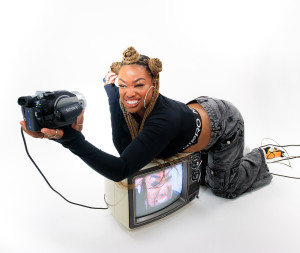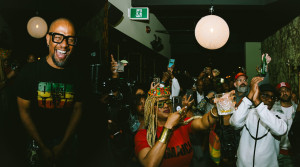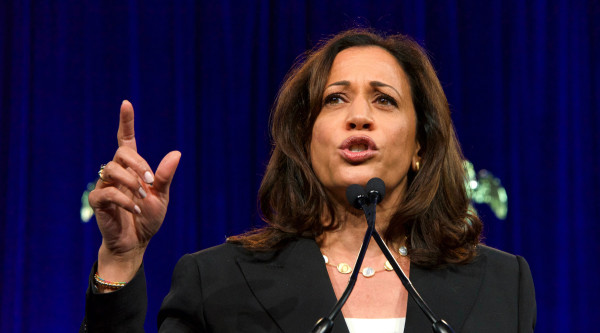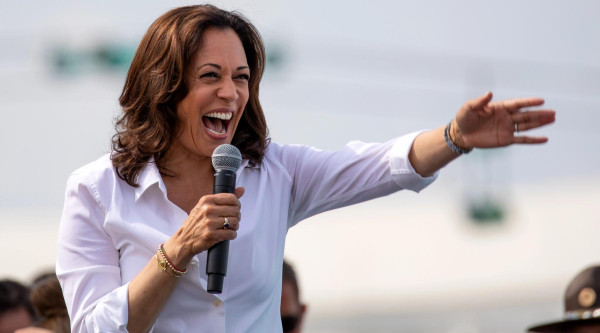A regular Black woman in jeans and a T-shirt. She looks like your aunty, your cousin, your mom, or maybe she looks like you.
She is just standing there. At rest.
Hands on her hips, doing nothing, minding her own business.
And people are mad at that.
The recently erected giant sculpture in New York’s Times Square by London-based sculptor Thomas J Price has elicited a number of reactions. Some racist reactions, of course, some sexist, some body shamers, and some Black folks themselves who feel like the depiction is ‘stereotypical’. But my takeaway from all this is that one of the most triggering things for people is seeing a Black woman at rest.
{https://www.instagram.com/p/DJsLWh8TsRc/}
In early April, thousands of Americans joined the #HandsOff protest across the United States, demanding ‘change’.
I watched some of the coverage on the news and you know what? I didn’t see Black women marching with signs, I didn’t see them at the front of the protest line where they usually would be. I went online and saw Black women at brunch, dancing, talking about books and makeup, encouraging each other to not protest, but to stay home and rest.
{https://www.instagram.com/p/DIEs2kaJGGR/?igsh=MTMzZGM3a290bnN0eg==}
After an overwhelming 92% of Black women backed the Democrats in the 2024 U.S. election, many of our Black American sisters have decided to focus on themselves and their communities, and let the chips fall where they may.
Things are a shambles in the U.S. My social feeds are full of angry people across the globe, cussing Trump about job cuts, funding cuts, tariffs, bullying Canada, Greenland, Panama, Mexico and, if we’re honest, the world. Black women did not cause these problems but yet again, the world wants us to fix them.
People are yelling, “Where is Kamala?!? Why isn’t she saying anything?”
{https://www.instagram.com/reel/DGipUGDxQBc/?igsh=NTk0ODRkZ29nZ3Zh}
Former Vice President Kamala Harris is now a private citizen because the American electorate didn’t vote for her. She is resting, as are the 92 percent of Black women who voted for her.
“Why isn’t she saying anything?!? Where is Michelle Obama?!”
Michelle Obama is quiet and resting, too.
So why are Black women are turning inward, focusing on themselves, their families, and building their communities? Because when it was necessary, when it was crucial to the benefit of Black people—and by extension, all people—the majority turned their collective back.
At least that’s what I’ve heard as a Canadian watching from the sidelines. But what are the Black women living and working in the U.S. saying?
Sasha Whitney is a first-generation Nigerian American based in Washington, DC. She is a fitness instructor and content creator who discusses social issues, particularly those affecting Black women. She uses her platform to reflect and share her perspectives on topics such as rest, community building, and the American socio-political climate. I found Sasha on my TikTok feed when I was looking up the April 5 protests against President Donald Trump and Elon Musk across the U.S.
I DM’d her and she agreed to speak with me. When I asked her why Black women are taking this time to rest, she referenced Malcolm X: “The most disrespected person in America is the Black woman. The most unprotected person in America is the Black woman. The most neglected person in America is the Black woman.”
Black women are frustrated.
"It's just so in your face that this country hates Black women so that they would rather choose the opposite, someone who would be a detriment to the vast majority of people, than to elect a Black woman. It makes you realize that so many people are comfortable being on the receiving end of the efforts, the gains of Black women—Black women's work, labour, time, energy, everything—but to be led by a Black woman?" said Sasha. "I have done my part. I did what I was supposed to do. I've showed up, I've marched, I've organized, I have reached out, I've done my research, I've done everything that I can do. And so many Black women continue to do everything they can do, but our voices are just not respected. People would rather our labour than our voice."
African American women knew what would happen if 2024 Democratic nominee Harris wasn’t elected. They protested, rallied, and voted for the first Black and Asian vice president (but not the first Black woman to run for president). Now, just three months into the current Trump administration, everything Harris predicted has come to pass.
When Sasha reflected on the 2024 election results, she realized things had to change. “What am I doing this for? It caused me to refocus and reflect my time, my energy, and how I can better use it. There's this idea that Black women are resting. We're staying... I don't want to say silent, but we're resting, minding our business and staying hydrated.”
So, she stopped protesting and decided to use her energy differently. That was her version of rest — but it looks different for everyone. For some, it’s showing up to protest when they feel like it. For others, it’s not showing up at all. For Sasha, it’s commenting on her social platforms about what is happening in the country. After the April 6 protests, she posted a video about a first-time protester, who is also a white woman, complaining about the lack of entertainment at the protest for her child. At first, Sasha thought it was rage bait, but after checking the woman’s profile, she realized it was a serious complaint.
“She's rating a protest, giving it a Yelp review,” Sasha recounted. “It’s so extremely tone deaf and exudes white privilege and the assumption of comfort as a right. It's not about you. It's about the larger message. A cause bigger than yourself, a cause that possibly could help your child someday, you're still thinking about you and your comfort.”
African Americans have never had the privilege to demand comfort when protesting. During the American Civil Rights Movement and the fight against apartheid in South Africa, Black children who protested couldn’t expect safety or comfort. They were attacked with fire hoses by police, attacked by dogs, beaten and brutalized, arrested, and sexually assaulted by police.
“It's Black children, not just in America, but globally, in their struggles and in their fight for freedom. There is no comfort. There is no bouncy house. They're out there legitimately fighting for their lives, their life, their freedoms. [This is] an example of what it is when we say we live in two separate worlds. We're fighting for two separate things."
Recently, I saw my friend Nneka at a mutual friend’s baby shower. It was a pleasant surprise because she had been living and working in the States. We started talking about the situation down south and she agreed to speak with me on the record — if I didn’t use her real name. She’s a Canadian citizen and is worried that U.S. border officials may not allow her back into the U.S. if she comments negatively about the Trump administration.
"I travel back and forth from Canada to the United States often and never have had any issues, but I am hearing a number of stories... I'm feeling it. I'm a little afraid and so is my family," she explained.
So, what does a Black Canadian living in New York City have to say about Black women sitting this out? Nneka looks at it like Sasha does: “This is not a fight for Black women. I am taking a seat and letting those who may have a more direct impact on the way that this has occurred take the lead on this."
Black women are the conscience of the United States. They are the canaries in the coal mine — but that also comes with a warning. “Many forget that canaries often showed signs of distress or died before anyone took heed of the warnings. While Black women try to illuminate critical issues affecting our world, we often risk our own well-being in the process,” stated an article posted by the University of Illinois Urbana-Champaign.
There is anxiety about the future, but Sasha believes Black Americans will be OK. “I'm always of the mindset that you control what you can control, and you leave the rest. So, what do I control? My energy,” she explained. “The beautiful part is that Black people are going to survive. Black people are the most prepared for this -- and Black women are especially prepared because we've been through this before.”

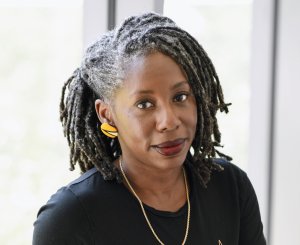 By
By 




